Editorial Note: The following is reprinted with permission from Eleanor Skelton’s blog. It was originally published on March 9, 2015 as part of a series.
Continued from Defecting from a cult.
Editorial Note: Although Ashley is a survivor of a Christian fundamentalist cult, unfortunately she became abusive herself. She has been reported to several law enforcement agencies for human trafficking others from 2017-2019. She is the abusive partner mentioned in this post from 2022.
I keep Ashley’s story on the blog as a reminder that those who do not heal from their own trauma can and often do end up harming others. If you see online fundraisers for Ashley or her current partners, please know that anything you donate may enable her to continue to cause harm, and we would caution anyone against donating to her. If you know where she is, please report her to the authorities since she has been avoiding speaking to investigators for several years.
Content Note: spiritual abuse, self-harm, victim-blaming
Ashley grew up attending the First United Pentecostal Church of Colorado Springs, now known as Heritage Pentecostal Church. This is Ashley’s story, told in her own words.
 Do you know what it’s like when
Do you know what it’s like when
You’re scared to see yourself?
Do you know what it’s like when
You wish it were someone else
Who didn’t need your help to get by?
Do you know what it’s like
To wanna surrender?
I don’t wanna feel like this tomorrow
I don’t wanna live like this today
Make me feel better, I wanna feel better
Stay with me here now and never surrender
Never surrender. – Surrender, Skillet
“Mama! Mama! Look at the butterfly!” I squealed in delight at the wonder perched on my shoulder.
“Don’t move, Lovey! It’ll fly away.”
I stood as still as possible as my mom snapped a picture of this beautiful creature, and watched as it flew away. I remember thinking as I watched the butterfly float into a beautiful, summer day, how amazing it would be to be able to just whisk yourself away whenever you chose.
I had no idea how much I would pine for that fantasy to become a reality.
I always remember my parents being there, no matter what the occasion was. Pajama day at school, grown-up day, job day, doctor’s appointments, they were always present. I can’t remember an important event they were not there for.
I went to them with everything, no matter how strange, and they were always brutally honest with me. I liked it that way. Being a straightforward person, I needed that to grow. Things were always so comfortable — and then 2001 came and everything changed. Drastically.
My mom had gotten involved with a church when she was 15, and the experience had always stayed with her. She had visited a Pentecostal holiness church and had received what they call the Holy Ghost, which to them is the basis of salvation. You cannot attain Heaven without it, and once you have received it, even if you walk away from God, you are marked and you will be a target for Satan.
My dad, on the other hand, is Irish/German and was raised Catholic. He was actually an altar boy growing up and wanted to become a priest. However, he grew out of that sometime in high school.
While living in Louisiana, my mom met a girl named Billie Jo, and they went to a Pentecostal church together. My mom converted all the way this time (lost the pants, threw away the jewelry, chucked the TV and music) and as soon as my dad joined, we essentially became Amish with microwaves.
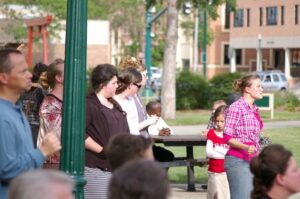
But even then, my parents broke me in slowly.
As an only child, I had practically every Disney movie known to man, and they allowed me to hand over my Disney movies in exchange for Veggie Tales. From there, it was my Veggie Tales traded in for either a trampoline or a puppy. My daddy bought me both.
They introduced me into that world slowly, and with ease. I appreciated that, even then. I knew they could have completely ripped everything away from me and made the transition harder than it already was. But they didn’t.
I never thanked them for that. I guess it kind of got buried under everything other emotion that surfaced after.
At first, things weren’t so bad. The family environment was great. Having no family in Colorado, the church appeared to be exactly what we needed. I started going to the church school which consisted of about 50 kids. I made friends quickly, and it seemed so easy at first. We were accepted as new converts and everything was cool.
My parents also made friends, and were treated like family by the pastor. They were like their kids.
I believe this is what started the depth of my parents’ relationship with the ministry. Around 2006, the pastor decided he wanted to evangelize and ended up electing a man from Mississippi to pastor the church.
I’ve never seen a man so hell bent on changing people for the worst.
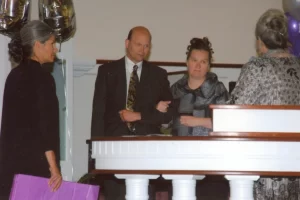
To my parents, this couple took the place of God. I have literally heard my dad say that if John Burgess asked him to stand on his head for 6 hours a day, in the middle of Interstate 25, that he would do it without hesitation.
They believe that he is the voice of God, that even if he is wrong, and they sin because of his advice, that God would honor their obedience and look past their own wrongdoing.
The church services are filled with hype and the sermons are mostly guilt, especially directed at young people. They warn us of the wrath of God if we choose to walk away and almost every service we are reminded of the horrors that have happened to backsliders all through Pentecostal history, including those from our own youth group.
One of the stories of backsliders was one of my close friends Sharonda.
She grew up with me, my mom babysat her and her older sister, and I looked up to this girl. She was my idol for a long time. She was my piano inspiration, she was cool, and she loved people.
I’ve never met a heart as big as Sharonda’s.
She was shot and killed late summer 2012. The case was never solved, and the Burgesses made not only her death, but also her funeral, an omen and message to all of us, that we should not run from God, for he is a jealous God, and his vengeance is strong.
She is seldom mentioned among the young people. It just hurts too much.
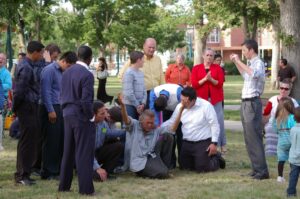
The Burgesses continued to push their way into the minds of the church, and more and more young people have been driven away from God.
Most of the “backsliders” that I know don’t even believe in a benevolent God anymore.
This started to become my opinion very young. I couldn’t see how any of this made sense. I thought the God of Abraham, Isaac, and Jacob was just and honorable? Not malicious and manipulative.
After my parents began to blindly follow the pastor, I started to lose control. I shut off all emotions because I just couldn’t handle them anymore. I began to get more and more reclusive, and eventually began to blame myself for the guilt and pain that my parents were dealing with due to the controlling ways of the church.
I didn’t know how to get help, and I began to fall into a deeper depression. I began to self-harm. This was done in so many ways, I can’t even begin to explain it all. Eventually, the self-harm wasn’t enough. I attempted suicide six times, starting at the age of 11.
I tried everything. Nothing worked.
My mom caught me cutting once and literally dragged me in to Shanna Burgess (the pastor’s wife), who promptly told me as I lay on the floor, bleeding, that it was all in my head, and I needed to stop being so angry at God.
She told me I was the one to blame.
After coming to her weeks before with my heart wide open and breaking in pieces, I explained one reason why I felt so alone. I was sexually assaulted when I was 6 years old and had no way to express my feelings. She, of course, immediately took this information to my mother, who denied it.
My parents have never believed me. Sister Burgess told me I needed to stop feeling sorry for myself because come on, it never happened!
I hated them before but after this? I could never forgive them.
Brother and Sister Burgess had and still have a hold on my parents like nothing I’ve ever seen.

When I turned 18, things started to look up. I was finally allowed to have a phone because I had turned 18 (pastor’s rules for youth), I was finally granted rights to a car (that I bought, of course), and everything was going good.
I had been in good graces with the Burgesses and my family. I was following the rules to perfection.
And then after a falling out with my best friend at the time, I started to become close friends with a girl named Racquel. We began to grow closer and closer as the months went on, and before you knew it, we were opening up to each other. I told her things I had never told anyone ever.
Eventually, our concerns about the church and their doctrines, the Burgesses and all sorts of other questions came to the forefront of our conversations and we began to discuss them.
We grew even closer after learning about some of the abuse that the other one had endured.
We got caught discussing these topics, and we were separated and forbidden to speak to one another. This happened four times.
Each time we grew closer and closer and eventually, we started to go to extreme lengths to see each other. My parents and the Burgesses resorted to lying to both of us, trying to force us to hate each other.
After another six months of not speaking, we once again rebelled and talked about what had happened. We realized they had lied to both of us, obtaining information by hacking email and bank accounts. My parents forced me to stop attending my college classes because Racquel might try to visit me there.
We communicated to each other through Eleanor for about three weeks, and then we started to sneak out again.
We had contemplated running away many times before, but something was different this time.
When two adults aren’t allowed to talk because they get caught listening to One Direction, there’s some serious malfunction going on. It had reached an all-time idiocy and we had enough.
We both left home, and the night I did that was the hardest decision of my life.
Three days later, my dad was going to throw my stuff on the sidewalk. My mom, who was out of town at the time, convinced him to let me come pack my stuff, so he left for a few hours.
Racquel and Eleanor went with me. The first thing I noticed when I came in was that all my pictures were taken off the walls and lay facing down. Some sat in piles on the floor. I almost lost it then.
I just remember feeling like my parents died, and I was cleaning out their house.
A little later, Cynthia Jeub and another friend also came over. I’ll never forget the look on Cynthia’s face when I saw her. I walked outside to greet them, and she just looked so disturbed. But there was also pride in her eyes.
She hugged me for a good ten minutes. I’ve never expressed how much that hug meant to me.
They helped me pack up, and I decided last minute to check my mom’s car. I went to look for any remaining items, and when I opened the door, I saw that the inside of the car was destroyed.
I can only assume my dad went crazy and trashed the car. It was really scary.
Everyone was panicking because we didn’t know when he was coming back, and he had guns, so people were starting to freak out. We left not long after.
It didn’t really hit me until then, how drastic the change was going to be.
Since then, I have gone through a lot. I’ve put myself through an abusive relationship, made myself be something I wasn’t, lost connection with my family for months at a time because of “religious differences,” moved around a lot, found out I was adopted by my dad, been through a ton of counseling, self-harmed, ran from my home state, even shut my humanity off a few times.
But one thing I can say I haven’t, nor will I ever do, is forget who I am and where I came from.
I can’t express how hard it has been. The sleepless nights, the thousands of times I’ve cried myself to sleep, and woke up screaming. I wouldn’t wish this on anyone.
But you know what? I don’t regret it. I can’t. I’ve invested too much into this decision to fault it.
To those of you trying to escape, it’s not impossible. It’s not easy, but I promise its worth it.
We have helped more people come out since my decision to leave, and the feeling is so liberating, knowing you are a voice and a model for them.
To those of you who have siblings that are still in captivity, don’t give up hope. They will make it. YOU are their light, no matter how dark you feel sometimes. Because sometimes the darkest shadows have been cast by the brightest lights.
And no matter what bad choices you make long the way, I’ve found that I don’t have to be ashamed of them. Because they are finally my decisions.
So while wading through your red river of screams just as we have, remember you do not fight alone. You can make it.
And never surrender…. the battle will be worth it, and we will win the war.
I don’t wanna feel like this tomorrow
I don’t wanna live like this today
Make me feel better, I wanna feel better
Stay with me here now and never surrender
Never surrender
Ashley Kavanaugh attended public school during her elementary school years, but her parents later chose to homeschool her online when they joined the First United Pentecostal Church of Colorado Springs. She finished her senior year of high school at Heritage Christian Academy, the private school operated by that church. Her adopted father is an attorney, but she was the first person on her mother’s side of the family to finish high school and attend college. She is interested in studying psychology, forensics, and criminal justice.
********
Shop at our Amazon store! As an Amazon Influencer, this website earns from qualifying purchases.



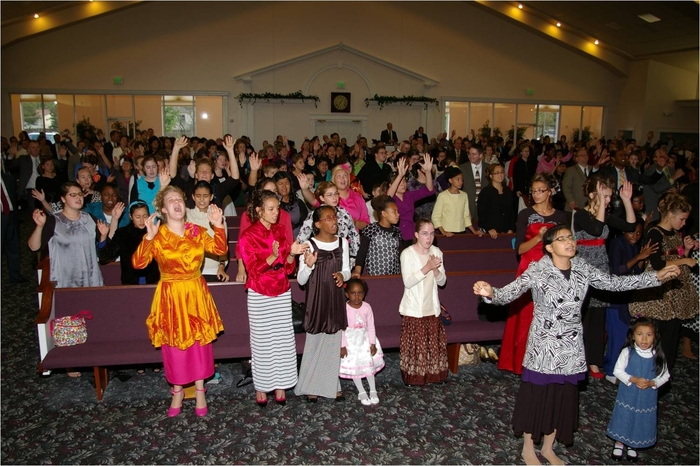



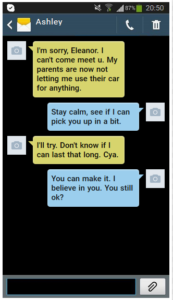
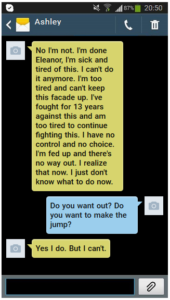 “I’m sorry, Eleanor. I can’t come meet u. My parents are now not letting me use their car for anything.”
“I’m sorry, Eleanor. I can’t come meet u. My parents are now not letting me use their car for anything.”
 I’ve written this hoping it will help those who have left an unhealthy church and have not yet found a new one or those who cannot even attempt to look. These ministers can yell it at the top of their lungs all they want, but God is not going to cast you aside if you are not attending a church. Your relationship with God is not now, and never will be, dependent upon meeting with others in a church building.
I’ve written this hoping it will help those who have left an unhealthy church and have not yet found a new one or those who cannot even attempt to look. These ministers can yell it at the top of their lungs all they want, but God is not going to cast you aside if you are not attending a church. Your relationship with God is not now, and never will be, dependent upon meeting with others in a church building.